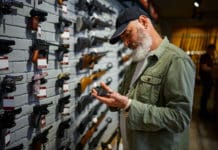“Practical shooting is a sport that evolved from experimentation with handguns used for self-defense.” That’s the official line from the USPSA website. It cleverly avoids the question: “Is USPSA competition applicable to real world self-defense?” As the rabbi will tell you, no, it isn’t Oh sure, the competition helps you become a better shooter. It increases your ability to shoot under pressure. It’s a lot of fun. But it does NOT teach you the tactical skills you need to survive in a real world gunfight. Joe Huffman’s video illustrates that point . . .
In the real world, you assess the situation and shoot the most dangerous person first, then the second, the third and then—man are YOU in deep shit! What the hell are you doing in a room with so many bad guys? If you open a door to a room full of people who need shooting you’re either special ops for real or someone who needs to close that door and run like hell.
Even in this situation, the advisability of double taps—sorry, “closely paired groupings”—is questionable. If there’s more than one bad guy, you need to shoot all of them once (in order of threat) before you give any of them seconds.
Of course, this is all just harmless fun. The only problem: it’s not a good idea to do anything with a gun that you wouldn’t do in real life. Train like it’s game day, or you risk reverting to inapplicable habits in the heat of battle.
For example, I’ve never seen a single person at a gun range draw a 1911 from a holster, disengage the safety, fire off a string (or better yet, not fire off a string), lower the gun to a ready position (or reload), engage the safety and reholster the weapon.
Nor have I ever heard anyone yell a challenge (i.e. DROP YOUR WEAPON). OK, that could be a bit . . . problematic. Still, the point remains. If you want to use a gun for self-defense, practice using a gun for self-defense.




While I think that all training is good training, this is not defensive training. React like this and you would go to jail. I can only speak from my non-lawyer understanding of Ohio law, but carrying a firearm is for defense. It isn’t for charging in and laying waste to a horde of bad guys.
I’m sorry to hear that you have never ran into people doing defensive drawing drill at the range. I do them. I know a few people who do them. It may be that many people do speed drills with an unloaded weapon. I can see the argument for safety.
Great post!
Sorry to hear you have never seen that. Every time I have gone to Front Sight, for instance, we practiced presenting the weapon (which includes disengaging the safety) making the decision to fire or not, going to the ready, doing a reload if needed and reholstering. When I was there (several times) that was a couple dozen people practicing just that. (and that was only the number on my range).
The stress training is valid and useful in conjunction with shoot/don’t shoot training.
Sometimes bad guys don’t come in one’s and two’s and sometimes you have to pick whether you’d rather be dead.
Many times you will find that the law wasn’t written for your situation and nobody really cares about right or wrong. They will be concerned with putting your behind, behind bars because they’re idiots, opportunists, fools or are politically correct public “servants” who care more about what the media thinks.
I’m developing a new target that shoots back with live ammunition. Now that will be real game-day training.
Is this realistic when you’re abruptly awaken from your sleep at 2:00 A.M. being
jolted out of bed by the sound of forced entry, breaking glass, or someone loudly
banging on your door? And the handgun inside your top dresser, night stand, or
inside a bureau drawer isn’t even a semi-automatic pistol, but instead is a .38
caliber revolver: a K-Frame Smith and Wesson Model 10 Military and Police, for
example? No, I don’t think this is practical for the average citizen.
LOL , RF I don’t know what we’re going to do with you! How many times are we going to post on this topic? Say what you want, but pistol/firearm competitions are beneficial if taken for what they’re worth. Just like baseball practice. In high school, we had a drill when we faced the backstop and coach tossed up balls as fast as he could. We had to step, swing, hit, and “reload” (aka get ready for the next “pitch”). Is this what we’re going to encounter in a baseball game? I hope not, although it would make MLB more interesting. It taught muscle memory, helped develop swing muscles that fatigued easily, and made us learn how to “spot” the ball quickly. Not every type of training needs to “represent” real-world scenarios. Honestly, nothing you or Rabbi does in training will represent a real gun fight except… well, a real gunfight! I played 4 years of football in high school and Division I college football. Practice, particularly in college, ran over 3 hours a day. Total time spent actually “practicing” real football was less than 30 minutes. Training is about response and muscle memory. If IDPA/IPSC competitions develop at least muscle memory, then they’re beneficial. Some will make the argument that under stress you can’t differentiate between one type of training or another. I say bullshit! Many different sports, military, and recreational drills practice one way and successfully transition to “real world” scenarios. If Peyton Manning put on a fluorescent vest during a game, I can guarantee that he’s still going to be tackled by a blitzing middle-linebacker!
Great post – and while I do lots of IDPA and Steel Challenge (mostly just cause its FUN) I don’t believe the scenarios are all that realistic either.
What has been most beneficial for me though is the practice of simply operating my gun under time pressure. When it clicks instead of bangs it forces practice and repetition of clearing procedure. When it runs dry, it forces practice of reloading under time pressure. It forces practice and repetition of things like storing and finding mags, shooting while moving, or just moving at all for that matter 🙂
So in addition to being plenty of fun, I do feel there is some real value in practicing some of the physical core skills under a little bit of stress. If nothing else, your first IDPA match will help show you how woefully underprepared you are!
Keep up the good work, love your blog!
Ah.., the Patrick I know and love is back…
“nothing you or Rabbi does in training will represent a real gun fight except… ”
Attend some realistic training and participate in well-done force and force training and you will see the folly of that statement.
“Attend some realistic training and participate in well-done force and force training and you will see the folly of that statement”…
Sorry Rabbi, physiologically and psychologically speaking, there is no one specific “training” that will prepare one 100% for any kind of fight, I don’t care how realistic it is. Training, even advanced and situation based training is still ‘training’. No matter how fast you heart is racing, you know that you life isn’t on the line. Last year I have taken 20+ hours of firearm and h2h martial arts based training courses, and I also help a Middle-Heavyweight MMA fighter train from time to time. I know that my mental state in a SHTF scenario will be very different than they were during my low-light training course. Going back to a sports comparison, look at any freshman or rookie quarterback. No matter how much they practice, no matter how much they prepare, they still need a couple years to “sharpen” their skills. It is just a law of nature.
Obviously, the more advanced training one has, the better they are. However, a person looking to sharpen their skills should use all options. IDPA/IPSC is fun (very fun!), and even you have admitted in the past that it is worthwhile to participate in in order to develop ones confidence in gun handling, holstering/unholstering, moving with a firearm, etc. Will it make someone a great “gun fighter”, of course not. Even I’ll admit to that!
Hit “post” too soon….
The operative word in gun fighting is not gun, it’s fighting. In actuality, there is no such thing as a gun fight, only a fight in which a gun may or may not be involved. Just because a gun is present, does not mean it can be used.
Winning a fight has little to do with weapon handling nor shooting skills, it is mostly a mental exercise. To learn to think like a fighter, you have get off the range.
The keys to survival are:
Awareness
Threat recognition
Threat level determination
Response determination
Action
Tactics
Only then comes skill with your defensive weapon and dead last is the specific weapon.
Well I’ve agreed with you on this before… mindset, skillset, then toolset. A weapon is nothing more than a tool. However, like I was trying to make the point above, if you don’t get some practice it will be an ineffective tool. A chisel can be used to trim a door latch opening, but it can also be used to turn a log into a beautiful carving. One needs many talents to turn a tree into statue, using a chisel is just one of those skillsets.
The problem with the argument that “competition shooting isn’t defensive training” is that no one who is a serious competitive shooter is actually making that argument. It’s essentially a well-constructed straw-man that people like to knock down to show that they’re serious defensive shooters or something.
True defensive training focuses on mindset and tactics – these are things that serious competitive shooters will tell you that competition doesn’t teach. What competition does teach is how to execute the fundamentals of marksmanship rapidly under stress. Sure, the stress of being timed and watched by your friends isn’t the same as the stress you’d experience in a gunfight, but training in simulated stress is certainly a marked step up from standing in a bay at an indoor range blasting away.
Ultimately, competition shooting teaches you how to shoot. If a shooter attends defensive shooting classes to learn tactics and mindset and also shoots competitively they’ll have the benefit of being a superior marksman from competition shooting as well as the tactical and defensive training afforded by a good defensive pistol class. Being able to handle your gun under stress at high speed is a skill developed by competitive shooters, which is why guys like Rob Leatham, Todd Jarrett, and other high level competition shooters are in demand as trainers for LEOs and military units.
“The problem with the argument that “competition shooting isn’t defensive training” is that no one who is a serious competitive shooter is actually making that argument. It’s essentially a well-constructed straw-man that people like to knock down to show that they’re serious defensive shooters or something.”
Well put. It’s been my experience that many people who claim to be “serious defensive shooters” aren’t particularly good shots. Hence, they use some “Tactical Macarena” to compensate for or obfuscate the issue. I’ve tested and watched this more times than I care to count.
Comments are closed.